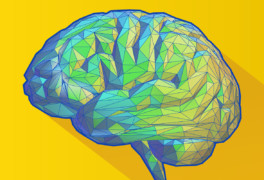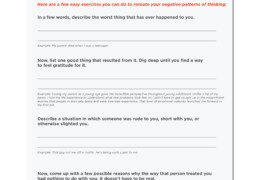
[tldr]
- One of the cheapest biohacks that’s available to everyone is learning how to forgive yourself and others.
- Negative thoughts and stress create physiological responses — changes in heart rate, respiration, hormone release — that are easy to recover from in small doses, and cause real damage with constant exposure over time.
- Re-framing false stories about yourself and others is powerful stuff. You’ll treat yourself and others better, you’ll be happier, and you’ll be a more magnetic person to be around.
- Here’s how to train yourself to look for the positive in everyone and everything.
[/tldr]
They call it baggage for a reason.
The anger, the hurt, the resentment you carry around with you weighs you down, holds you back, and keeps you from becoming the badass you were meant to be.
I’m not just talking about feeling down because your mindset is in a bad place. Sure, negative feelings and thoughts weigh on your mind, but it doesn’t stop there. Negativity and stress create physiological responses — changes in heart rate, respiration, hormone release — that are easy to recover from in small doses, and cause real damage with constant exposure over time.
Unpleasant emotions are a part of life. In an episode of Bulletproof Radio (iTunes), emotional expert Joan Rosenberg, Ph.D. explains that it’s crucial that you experience your negative emotions.
“So that rather than feeling like you’re falling apart, or you’re unraveling, or you have to shut down, what you’re able to do is actually to stay present to what you’re experiencing in the moment, and then not do anything to try to get away from it. No avoidance, no distraction, no disconnection. And you move through it,” she recommends.
The good news is, you’re a biohacker, so you’re in control here. Your thoughts are inputs, just like food and supplements. So, how do you load up your plate with some thoughts and close the fridge on others?
Waking up and saying, “I’m going choose to be happy today” is a start, but it only takes you so far. It takes practice to shove your thoughts out of the driver’s seat and take control so that negativity doesn’t control you.
Here’s how to do it.
Identify the stories you tell yourself (aka stop lying to yourself)
Your brain is lazy. That’s not meant to be an insult. What I mean is, your brain plows through a huge portion of your body’s energy, so it takes the path of least resistance whenever possible to conserve resources.
One of your brain’s favorite shortcuts is using a story over and over. It’s an efficient system when you’re telling good stories, but sometimes your brain decides to ride on a train of lies.
An example of a story: I’m stupid.
How your brain recycles this story: I can’t study for this exam because I’m stupid. My business isn’t taking off because I’m stupid. I got passed over for that promotion because I’m stupid.
This kind of story you tell yourself is so common that it has its own category: limiting beliefs.
Identifying your own limiting beliefs is one of the most powerful life hacks you can do, and it’s free. It’s so powerful that I have an entire section on it in my new book “Game Changers: What Leaders, Innovators, and Mavericks Do to Win at Life”. Any time you think you can’t do something because of a character flaw, or that some attribute you have is holding you back, you’re up against a limiting belief.
Limiting beliefs can be so strong that you think they’re as set-in-stone as your height or eye color. It’s your job to recognize when you’re lying to yourself and change it. For example…
I’m not stupid. I need to organize the material better so that I can learn it for the exam. I’m going to make an outline so that I can break this all down into digestible chunks.
I’m not stupid. I’m new at this business. Every great entrepreneur has several mentors. Time to start looking for one.
Jim turned heads with his last presentation. His stellar report was fresh in the leadership’s mind, and that’s probably why he was promoted over me. If I keep up my performance, I’m a shoe-in for advancement next quarter.
Instead of letting your brain recycle these stories, it’s up to you to introduce new ones and intentionally use them as much as possible. Then, your brain will recycle those ones instead of your limiting beliefs.
RELATED: The Bulletproof Mind — Upgrade Your Brain for Better Focus
How to forgive others
Self-pity is one of many forms of heavy, negative thinking. Another big one is being angry with people or situations.
You’re not going to get through life (or even a few months) without pissing someone off at some level or getting pissed off at someone else. It’s part of human interaction. It’s how you deal with it that makes the difference.
When you encounter a negative situation, your nervous system reacts the same way it reacts if you were being chased by a pack of coyotes. Once your (lazy!) brain decides something threatened your safety, it goes into the “danger” bucket. Your brain recycles information for efficiency, so once your brain labels something a danger, it’s tough to disassociate that label.
How does that play out in life?
If someone bumped into you in the hallway, and you perceived it as a shove, you’re going to label that person as aggressive and put your guard up. If you got triple the workload of your colleagues, you might perceive it as others trying to skate by at your expense.
It’s easy to fall into an “everyone’s out to get me” mode of thinking. With the exception of a few a-holes, most people want to get along. That means most of the time, when you think someone slighted you on purpose, they didn’t. A lot of the time, the stories you’re telling yourself about others’ rudeness, shortness, etc. are simply made-up.
When you start to feel this way, try to come up with reasons why people treated you in certain ways. Fight fire with fire — make up your own crazy positive stories instead of defaulting to the screwball negative ones. Pick a story that allows you to empathize with their rude or mean behavior.
It can be realistic: Liz didn’t realize that I had this other project going on at work, and that’s why she gave me extra tasks.
Or it can be a little outlandish: Jerry had food poisoning and had to get to a bathroom, so he wasn’t paying attention and bumped into me in the hallway.
The story you come up with can be pretty out-there, as long as it allows you to see that there may be reasons the other person acted the way they did, that had nothing to do with you.
Because it probably had nothing to do with you.
The missing piece to true forgiveness: gratitude
Saying you forgive a person or that you’re “letting go” helps. True forgiveness, where you combine forgiveness and letting go with a sense real gratitude for having experienced it, has a positive effect on you at the cellular level. Feeling thankful for crappy situations literally rewires your brain to dissolve negative feelings about the situation, to feel happier in the moment, and with practice, you’re training your mind to look for satisfaction and even joy in every situation.
Now, you have a little bit of homework. Here’s how to spin a positive light on every situation.
RELATED: Use Gratitude to Rewire Your Brain
How to practice effective forgiveness for positive thinking
Here are a few easy exercises you can do to reroute your negative patterns of thinking. I’ve listed a few examples to get your gears turning.
In a few words, describe the worst thing that has ever happened to you.
My parent died when I was a teenager.
The bank repossessed my house when I lost my job after my company restructured.
I wasted four years on the worst relationship of my life.
Now, list one good thing that resulted from it. Dig deep until you find a way to feel gratitude for it.
Losing my parent at a young age gave me incredible perspective throughout young adulthood. Unlike a lot of my peers, I had the life experience to understand what real problems look like, so I didn’t have to get caught up in the insignificant worries that people in their late teens and early twenties experience. That level of emotional maturity launched me forward in my first job.
I wouldn’t have challenged myself to learn a new skill set that makes me more marketable if I had stayed with the former company. I’m with a new company now that’s much more solid, and I met some of my best friends in my new neighborhood.
Having dated that loser, I recognize red flags when I see them. My dating life is much healthier now.
Describe a situation in which someone was rude to you, short with you, or otherwise slighted you.
That guy cut me off in traffic. He’s being such a jerk to me.
It’s like my nurse doesn’t even care. I rang the call button almost an hour ago. He’s totally ignoring me.
Now, come up with a few possible reasons why the way that person treated you had nothing to do with you. It doesn’t have to be real.
That crazy driver’s wife is in the ER right now having a miscarriage and he wants to be there for her. I am grateful that I could get out of the way, and I hope he gets through this traffic jam soon.
The nurse was having a difficult conversation with the family next door and providing emotional support when they needed it most. I am grateful to do my part by giving them space. I can see that my nurse is working hard and he’ll get to my room when he can.
Make a list of people or situations that make you feel anger or resentment whenever you think of them. Bonus points if you feel the physical effects of anger when you think of these people or things. It’s a strong signal that this is a good situation to work through.
My kids adore their grandparents, but they come dead last on my parents’ priority list and that breaks my heart for them.
Dwight totally hijacked my big work project to get the boss’ attention, and he’s ruining it for the whole team.
Do these stress-busting breathing techniques to return to a good state. Then, list at least one reason to be grateful for these negative interactions.
Uninterested grandparents made it really easy for my family to relocate for a better work opportunity and better area for the kids to grow up in. This move is shaking my kids’ world enough as it is, and I am grateful that their relationship with their grandparents won’t change much or add to the stress.
Having that project off of my plate frees me up to focus on this other project that is really taking off. Plus, I am grateful that I didn’t get an ounce of blame for that disaster.
Positive thinking, gratitude, and forgiveness aren’t things that happen in a day. It takes practice. You train it like a muscle. In time, it will come naturally, and you’ll find yourself happier, less stressed, less distracted by things like anger and resentment. Start today, and see how you feel next week.














